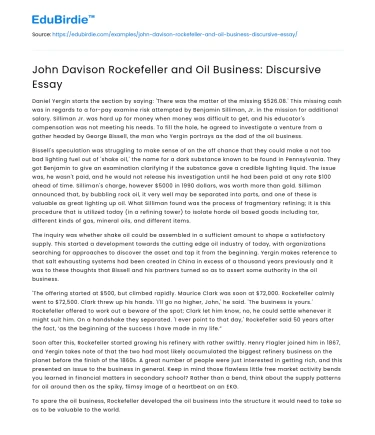Introduction
John Davison Rockefeller, a name synonymous with the oil industry, was a pivotal figure in shaping the modern business landscape. As the founder of Standard Oil Company, Rockefeller's strategies in business operations and market control have been both lauded and criticized, reflecting a complex legacy. His influence extended beyond mere economic success; he transformed the oil industry into a cornerstone of the American economy and significantly contributed to the development of global industries. This essay delves into Rockefeller's impact on the oil business, exploring his business practices, the controversies surrounding his methods, and the long-lasting implications of his endeavors. Through a detailed examination, we will unravel how Rockefeller's vision and tactics left an indelible mark on the industry, while also addressing the criticisms and counterarguments that his business model incites.
Business Strategies and Market Domination
John D. Rockefeller's approach to business was characterized by a strategic ruthlessness and innovation, which enabled him to dominate the oil market. His methods included horizontal integration—acquiring competitors to monopolize the market—and vertical integration, where he controlled all aspects of production, distribution, and marketing. By 1882, Standard Oil had become a colossal trust, controlling approximately 90% of U.S. refineries and pipelines. Rockefeller's ability to negotiate favorable rates with railroads, as documented by Chernow (1998), allowed his company to undercut competitors, further solidifying his market dominance.
Save your time!
We can take care of your essay
- Proper editing and formatting
- Free revision, title page, and bibliography
- Flexible prices and money-back guarantee
One of Rockefeller's notable strategies was the use of predatory pricing, selling oil below cost to eliminate competition, a tactic that remains controversial today. Critics argue that such practices stifled innovation and entrepreneurship, creating a market devoid of competition. However, proponents suggest that his methods led to lower prices for consumers and improved efficiencies in production (Yergin, 1991). By standardizing processes and investing in technology, Rockefeller not only maximized profits but also set the foundation for modern corporate practices. Despite the ethical debates surrounding his strategies, the effectiveness of Rockefeller's business acumen in establishing a formidable corporate empire is undeniable.
Philanthropy and Ethical Considerations
Beyond his business ventures, Rockefeller's legacy is equally marked by his extensive philanthropic efforts. His creation of institutions such as the Rockefeller Foundation, the University of Chicago, and the Rockefeller Institute for Medical Research demonstrates his commitment to societal betterment. These contributions have had a lasting impact on education, science, and public health, reflecting a complex interplay between his business achievements and ethical considerations. As noted by Harr and Johnson (1988), Rockefeller believed in the concept of the "Gospel of Wealth," asserting that the affluent should redistribute their wealth for the greater good.
Nonetheless, Rockefeller's philanthropy does not absolve the ethical concerns surrounding his business practices. The perception of his wealth accumulation through monopolistic activities often overshadows his charitable contributions. Critics argue that his philanthropy served as a means to launder his image, creating a dichotomy between his public persona and private dealings. Despite these criticisms, Rockefeller's philanthropy left an indelible mark on society, showcasing the duality of his legacy as both a titan of industry and a benefactor of public good.
Regulatory Challenges and Legacy
The dominance of Standard Oil eventually led to significant regulatory challenges, culminating in the landmark antitrust case of 1911, where the U.S. Supreme Court ordered the dissolution of Standard Oil into 34 independent companies. This decision was pivotal in shaping antitrust laws and paved the way for future regulatory measures against monopolistic practices. As discussed by Tarbell (1904), this case exemplified the tension between free enterprise and regulatory oversight, highlighting the need for balancing corporate power with public interest.
Rockefeller's legacy in the oil industry is multifaceted, embodying both the transformative potential of industrial capitalism and the perils of unchecked corporate power. His business model influenced subsequent generations of industrialists and policymakers, underscoring the importance of innovation, efficiency, and strategic foresight. However, the ethical and regulatory challenges that arose from his practices serve as cautionary tales for contemporary businesses. As such, Rockefeller's impact transcends the confines of his era, offering lessons on the complexities of navigating industrial leadership and corporate responsibility.
Conclusion
In conclusion, John D. Rockefeller's influence on the oil industry is profound and enduring. His pioneering business strategies revolutionized industrial practices, setting a precedent for future corporate endeavors. Despite the controversies and ethical dilemmas associated with his methods, Rockefeller's contributions to the economy and philanthropy cannot be overlooked. His legacy is a testament to the transformative power of strategic vision and innovation, while also serving as a reminder of the need for ethical considerations and regulatory frameworks in business operations. As we continue to grapple with the challenges of modern capitalism, Rockefeller's story offers valuable insights into the delicate balance between ambition and responsibility in the pursuit of industrial and societal progress.






 Stuck on your essay?
Stuck on your essay?

